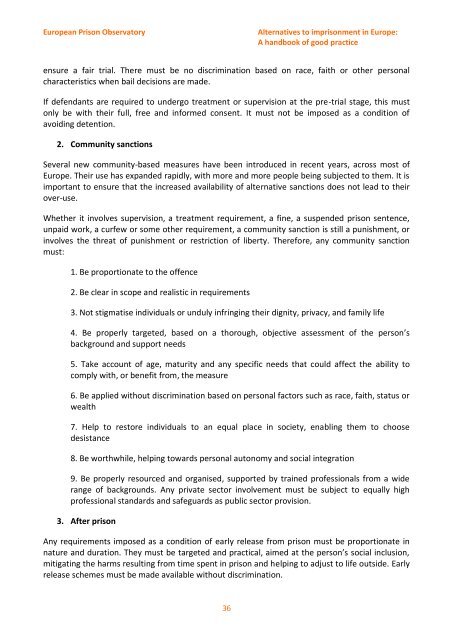good practice
Alternatives%20to%20imprisonment%20in%20Europe
Alternatives%20to%20imprisonment%20in%20Europe
You also want an ePaper? Increase the reach of your titles
YUMPU automatically turns print PDFs into web optimized ePapers that Google loves.
European Prison Observatory<br />
Alternatives to imprisonment in Europe:<br />
A handbook of <strong>good</strong> <strong>practice</strong><br />
ensure a fair trial. There must be no discrimination based on race, faith or other personal<br />
characteristics when bail decisions are made.<br />
If defendants are required to undergo treatment or supervision at the pre-trial stage, this must<br />
only be with their full, free and informed consent. It must not be imposed as a condition of<br />
avoiding detention.<br />
2. Community sanctions<br />
Several new community-based measures have been introduced in recent years, across most of<br />
Europe. Their use has expanded rapidly, with more and more people being subjected to them. It is<br />
important to ensure that the increased availability of alternative sanctions does not lead to their<br />
over-use.<br />
Whether it involves supervision, a treatment requirement, a fine, a suspended prison sentence,<br />
unpaid work, a curfew or some other requirement, a community sanction is still a punishment, or<br />
involves the threat of punishment or restriction of liberty. Therefore, any community sanction<br />
must:<br />
1. Be proportionate to the offence<br />
2. Be clear in scope and realistic in requirements<br />
3. Not stigmatise individuals or unduly infringing their dignity, privacy, and family life<br />
4. Be properly targeted, based on a thorough, objective assessment of the person’s<br />
background and support needs<br />
5. Take account of age, maturity and any specific needs that could affect the ability to<br />
comply with, or benefit from, the measure<br />
6. Be applied without discrimination based on personal factors such as race, faith, status or<br />
wealth<br />
7. Help to restore individuals to an equal place in society, enabling them to choose<br />
desistance<br />
8. Be worthwhile, helping towards personal autonomy and social integration<br />
9. Be properly resourced and organised, supported by trained professionals from a wide<br />
range of backgrounds. Any private sector involvement must be subject to equally high<br />
professional standards and safeguards as public sector provision.<br />
3. After prison<br />
Any requirements imposed as a condition of early release from prison must be proportionate in<br />
nature and duration. They must be targeted and practical, aimed at the person’s social inclusion,<br />
mitigating the harms resulting from time spent in prison and helping to adjust to life outside. Early<br />
release schemes must be made available without discrimination.<br />
36





